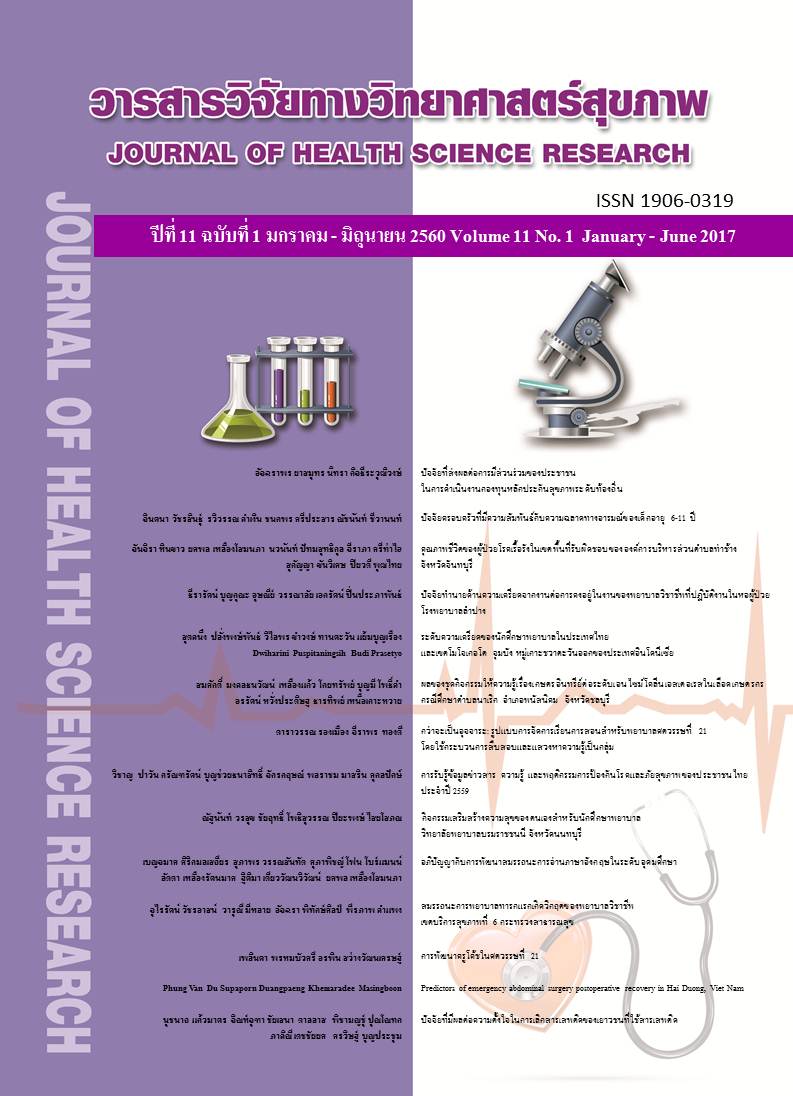กิจกรรมเสริมสร้างความสุขของตนเองสำหรับนักศึกษาพยาบาล วิทยาลัยพยาบาลบรมราชชนนี จังหวัดนนทบุรี
Main Article Content
บทคัดย่อ
บทคัดย่อ
ความสุขเป็นเรื่องส่วนบุคคลเป็นนามธรรม คนเราอาจจะไม่รู้ตัวว่ามีความคิดอัตโนมัติที่เป็นสาเหตุทำให้ไม่มีความสุข การปรับโครงสร้างความคิดเป็นเทคนิคที่ใช้ได้ผลดีที่จะทำให้คนมีความสุขได้ การวิจัยเชิงพัฒนานี้ มีวัตถุประสงค์เพื่อพัฒนากิจกรรมเสริมสร้างความสุขของตนเองสำหรับนักศึกษาพยาบาลวิทยาลัยพยาบาลบรมราชชนนี จังหวัดนนทบุรี อาสาสมัครวิจัย คือ นักศึกษาพยาบาลชั้นปีที่ 4 จำนวน 11 คน วิเคราะห์ข้อมูลโดยใช้สถิติ ความถี่ ร้อยละ Wilcoxon Signed Rank Test และการวิเคราะห์เนื้อหา
ผลการวิจัยพบว่า กิจกรรมเสริมสร้างความสุขของตนเอง ประกอบด้วย 3 ส่วน คือ ส่วนที่ 1 การประชุมชี้แจงวัตถุประสงค์ การใช้เครื่องมือ แบบสอบถามความสุข Oxford Happiness Questionnaire (OHQ) การเข้าร่วมกิจกรรมให้อาสาสมัครเข้าใจ การให้คำแนะนำหลักการความคิดที่บิดเบือน และหลักการปรับโครงสร้างความคิด ส่วนที่ 2 การนัดหมายพบรายบุคคลระหว่างผู้วิจัยกับอาสาสมัคร เพื่อดำเนินการปรับโครงสร้างความคิด ประกอบด้วย 4 ขั้นตอน ขั้นตอนที่ 1 การสำรวจอารมณ์ ขั้นตอนที่ 2 การสำรวจความคิด ขั้นตอนที่ 3 การปรับความคิด ขั้นตอนที่ 4 การประเมินความรู้สึก ส่วนที่ 3 การสรุปผลเป็นการพบอาสาสมัคร เพื่อสรุปผลการวิจัยโดยการทำแบบสอบถามความสุขซ้ำอีกครั้งหนึ่ง การสะท้อนความคิด ประสบการณ์การเข้าร่วมกิจกรรมพบว่า คะแนน OHQ ของอาสาสมัครหลังการทดลองสูงกว่าก่อนการทดลองอย่างมีนัยสำคัญทางสถิติ (p=.003) อาสาสมัครทุกคนมีความเห็นว่าตนเองสามารถปรับความคิดของตนเองได้ทำให้มีความสุขขึ้น และมีความพึงพอใจในกิจกรรมเสริมสร้างความสุขของตนเอง รวมทั้งมีความเห็นว่าการปรับโครงสร้างความคิดนั้นไม่ยาก สามารถทำได้เนื่องจากเป็นการปรับที่ตนเอง
Abstract
Happiness is a subjective matter. Individuals might unconsciously have thoughts that causes unhappiness. Cognitive restructuring is an effective technique to make those individuals become happy again by awaring then correcting that unhappy automatic thoughts. This study aimed to develop happiness enhancement activity for nursing students in Boromarajonani College of Nursing, Changwat Nonthaburi. This developmental research was conducted among eleven voluntary final year nursing students. Data were analyzed by using frequency, percentage, Wilcoxon Signed Rank Test and Content analysis.
The research comprised three parts: 1) introduction meeting including a) subjects examined their happiness by completing Oxford Happiness Questionnaire (OHQ) for the first time, b) made subjects understanding their roles and the role of the researcher throughout the activity, and c) introduced the concepts of “distorted thought” and “cognitive restructuring”; 2) individual sessions. Each subject met the researcher to conduct a cognitive restructuring consisting of 4 steps, including the first step: emotional assessment, second step: thought assessment, third step: cognitive adjustment, fourth step: feeling evaluation; and 3) conclusion meeting: all subjects and researcher get together to reexamine their happiness by using OHQ and reflected their experiences during the activity.
The findings showed that: 1) OHQ score of each subject was significantly higher at conclusion meeting than the first time score (p=.003); 2) their reflection showed the success of the activity and the satisfaction towards the activity; and 3) all subjects reached consensus that the cognitive restructuring was not difficult due to self-adjustment technique.
Downloads
Article Details
บทความที่ได้รับการตีพิมพ์เป็นลิขสิทธิ์ของวิทยาลัยพยาบาลบรมราชชนนี จังหวัดนนทบุรี
ข้อความที่ปรากฏในบทความแต่ละเรื่องในวารสารวิชาการเล่มนี้เป็นความคิดเห็นส่วนตัวของผู้เขียนแต่ละท่านไม่เกี่ยวข้องกับวิทยาลัยพยาบาลบรมราชชนนี จังหวัดนนทบุรี และคณาจารย์ท่านอื่น ในวิทยาลัยฯ แต่อย่างใด ความรับผิดชอบองค์ประกอบทั้งหมดของบทความแต่ละเรื่องเป็นของผู้เขียนแต่ละท่าน หากมีความผิดพลาดใด ๆ ผู้เขียนแต่ละท่านจะรับผิดชอบบทความของตนเองแต่ผู้เดียว


